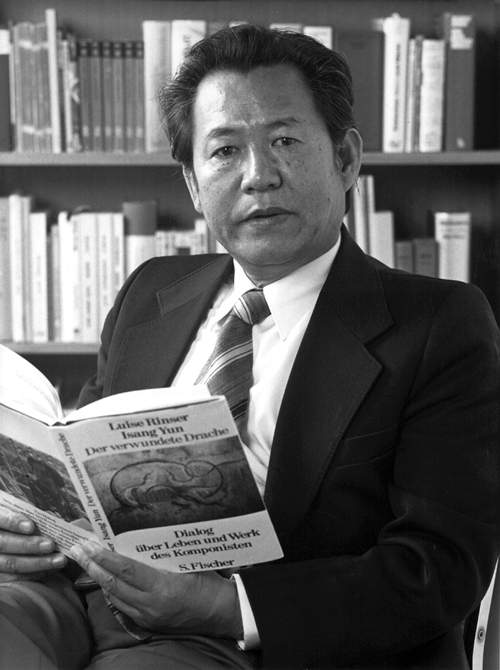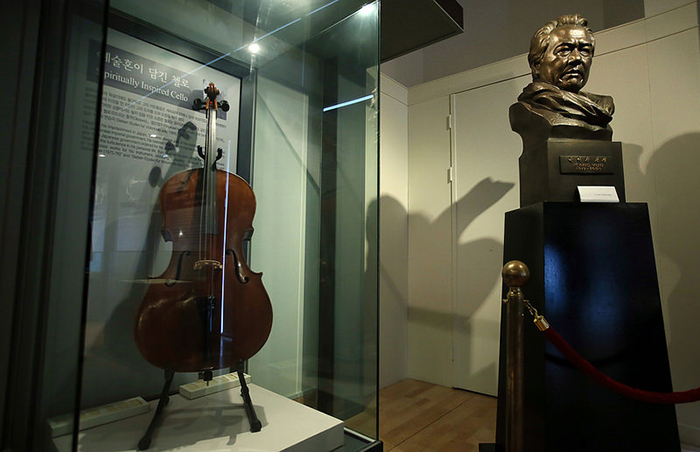
In celebration of the 100th anniversary of the birth of the Korea-born German composer Yun Isang (1917-1995), news outlets in both Korea and Germany publish stories about the late composer's legacy and body of work. (Yonhap News)
By Min Yea-Ji and Lee Hana
This year marks 100 years since the birth of the late composer Yun Isang (윤이상) (1917-1995).
In celebration, news outlets in both Korea and Germany, his adopted home, have been publishing stories to pay tribute to the late composer and to his body of work.
Blick aktuell, a daily in Germany's Rheinland-Palatinate state, publishes an article on Oct. 10 in praise of a Yun Isang tributary concert, Teile dich Nacht (Divide, Night), held at the Görreshaus concert hall in Koblenz, Germany, on Oct. 3. (Blick aktuell screen shot)
On Oct. 3, a Yun Isang tributary concert, Teile dich Nacht (Divide, Night), was held at the Görreshaus concert hall in Koblenz, Germany. The concert was included in the program for the 23rd Mendelssohn Week.
Following the concert, on Oct. 10, Blick actuell, a daily based in the German state of Rheinland-Palatinate, published an article in praise of the performance.
"Yun Isang composed a tune to the poem 'Teile dich Nacht' by German-Jewish poet Nelly Sachs. The composition fills today's concert halls as a masterpiece," said the article.
"After hearing this tune of reconciliation, the audience could not but clap and cheer for a very long time," it added.
In celebration of the 100th anniversary of the birth of the Korea-born German composer Yun Isang (1917-1995), Deutschlandfunk, a German public radio station, presents several stories about the late composer and his body of work. (Deutschlandfunk)
Deutschlandfunk (DFL), a German public broadcasting radio station, also reported on Yun Isang in celebration of his centennial.
On Sept. 18, the broadcaster published "The many sounds of Yun Isang's music."
Saying that, "Yun Isang's unique pieces marry the sounds of Korea's traditional music and Western instruments," the DFL reported that, "Yun always sought to find the roots of his Korean heritage." Borrowing the words of German flutist Roswitha Staege, the broadcaster deemed Yun to be "more than just a Korean composer."
Mentioning a special talk titled "Yun Isang Today" organized by Berlin's Akademie der Künste, the DFL said that, "Yun Isang regained his reputation relatively late in his native country."
In addition to this article, the DFL published several other features, including "Yun Isang Centennial: the Korean music connection" and "Yun Isang, the North and South Korean composer," both in commemoration of the composer.

This year marks 100 years since the birth of the Korea-born German composer Yun Isang (1917-1995). Pictured is an exhibit on display at the Yun Isang Memorial Hall in Tongyeong, Gyeongsangnam-do Province. (Korea.net DB)
Yun Isang was born in Tongyeong, Gyeongsangnam-do Province, and died in Berlin. He majored in music composition at the West Berlin Hochschule für Musik.
In 1967 while living in West Berlin, he was kidnapped by the South Korean secret police, charged with espionage and sentenced to life imprisonment. However, a worldwide petition led by a large group of artists, including composer Igor Stravinsky and conductor Herbert von Karajan, helped push for Yun's release. Subsequently, he returned to West Berlin and later, in 1971, obtained West German citizenship.
In 1988, the German government awarded Yun a medal of honor for his contributions to the field of music.
Yun's representative pieces combine the musical sounds of the East and West, and were composed with intense longing for his home country. Some of his best known pieces include "Teile dich Nacht" and pieces with Korean titles, such as "Bara" (바라), "Muak" (무악) and "Yeak" (예악).
jesimin@korea.kr
Most popular
- Grammy-winning producer calls Suga of BTS 'amazing artist'
- 'Universal love, family' themes fuel success of 'King of Kings': director
- Council sets minimum hourly wage in 2026 at KRW 10,320
- Expansion of foreign app system raises tourist convenience
- Nat'l population diversity rose nearly 8% from 2018-22: study
